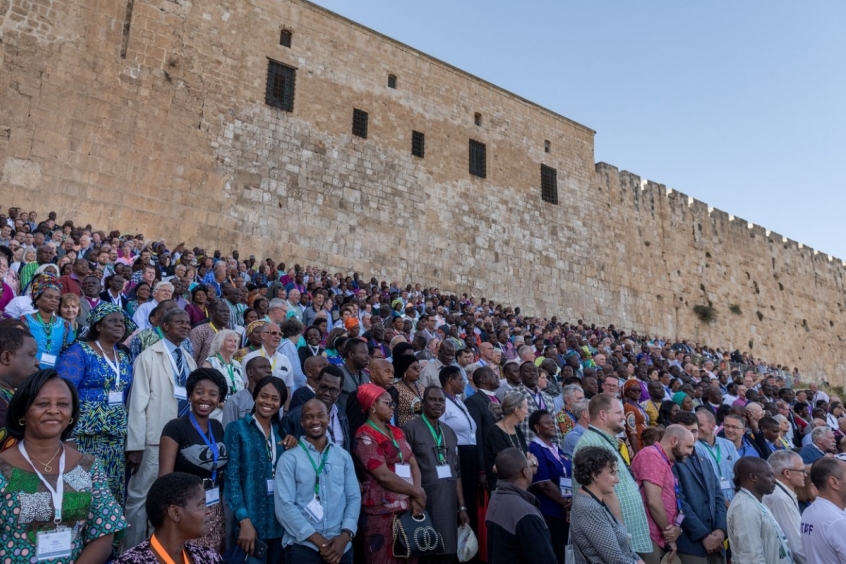Last week, I attended the 2018 Global Anglican Future Conference (GAFCON) in Jerusalem. Around 2,000 archbishops, bishops and Anglican church leaders from North and South America, Europe, Africa, Asia and Australia came together to pray and consider the future of the global Anglican church. Some estimate that it was the largest international gathering of Anglican leaders in over 50 years.
GAFCON rose out of the Anglican church's struggle with an issue that has become the leading cause for disagreement in Christianity: same-sex marriage. It's the reason why hundreds of Anglican bishops in the southern hemisphere — who hold on to the traditional biblical view of marriage — have strongly differed with many of their more liberal counterparts in the West.

Still, as important as it might be, the issue of same-sex marriage is only the tip of the iceberg.
The real question Christians all over the world must answer today is whether or not they will hold on to the authority of Scripture and the gospel the church has historically believed in.
As an outsider, I've observed how the West – and America specifically – has been steadily inching toward secularism, which is the absence of God in life.
The meteoric rise of the religiously unaffiliated over the past few decades combined with social changes such as the legalisation of same-sex marriage across all 50 states and the emergence of forced tolerance have augured the end of a 'Christian' America. Though it might still be some time away, the American church is now facing the crude reality many Christians across the southern hemisphere know well: becoming a minority religion.
Here's the thing though – this is nothing new for Christians. From the very beginning, Christianity has been well acquainted with being a minority.
Jesus gave the first believers – about 120 disciples – the job of changing the world. This small community believed Jesus and took him at his word, which was no easy task. The cultural problems and challenges they confronted were similar, if not greater, to ours. They had to contend with the widespread breakdown of the family structure, serious moral decline, a hedonistic lifestyle and religious fundamentalism of its day. If you want to see what real moral decline looks like, open a book on first-century Rome and read about the unbridled paganism, rampant sexual immorality, infanticide and slavery of the Roman Empire.
Yet, even when facing such overwhelming odds, the early church did not lose their vision of the Kingdom of God. The early Christians painstakingly developed a counterculture within a hostile environment dominated by despotic Roman emperors such as Nero, who was bent on eradicating this start-up religious movement.
No matter who was Caesar in Rome, they honoured Jesus Christ as Lord of all. They believed in the resurrection, and in his second coming. And no matter what the culture around them said, they remained committed to the truth in the God-inspired Scriptures, especially when it pertained to issues such as the biblical definition of marriage. They believed the Kingdom of God that Jesus had inaugurated was Spirit-empowered.
So, when people accused the early Christians of turning the world upside down, it wasn't a cliché. They were living upside-down lives in a society that was putting immense pressure on them to conform to the culture. Contrary to the short-sightedness that plagues many Western churches today, the early Christians had a long view of the Kingdom of God, and a holistic understanding of Christian discipleship. Their obedience literally changed the world and the flow of history.
Coming from a region in the world where Christians face dire persecution, I am disheartened to see such a large group of Christians in the West passively accept the decline of the church and its life-changing impact on society. I find it puzzling when the concept of a post-Christian Europe or United States is stated as an inevitable reality, when history knows that by and large Christianity built the modern West and paved the way for the individual democratic rights they enjoy today.
Yes, secularism might be the new religion on the block, but we can't forget it hasn't proved it can build a civilisation or a culture capable of holding society together over generations. This is because secularism neither cares for the family unity nor the divine.
The civilisations that have survived over millennia – from China to India, the Middle East and the Judeo-Christian world – hold a strong belief in God, no matter which deity they believe in. They know meeting the need of the spiritual is a given factor of life. And these cultures by the same token believe in the traditional family unit as the foundation of society.
The tragedy of the Western world is thinking it can survive without its Judeo-Christian foundation, without a commitment to God or the traditional family unit.
So, what's the answer for Christians in the West today? It's simple: get back to your roots.
Get back to your roots in the timeless gospel of Jesus. Cultural movements come and go. The Kingdom of God will continue forever. Be compassionate to those struggling with same-sex attraction and reject homophobia; Jesus loves them intensely and knows how to minister to them. But stay true to the radical, holistic calling of following Jesus.
Jesus' time-tested formula for finding life and happiness is to lose it all for him. It has delivered throughout the centuries more than any other formula, and still delivers today.
Most Rev Joseph D'Souza is the archbishop of the Anglican Good Shepherd Church and Associated Ministries of India. He also serves as the president of the All India Christian Council. He is the recipient of numerous awards and accolades for his work as a human rights activist.













